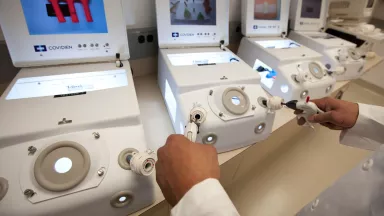Introduction
Our world-renowned orthopedic surgeons and orthopedists are experts in their fields with specialized training to provide the optimal diagnosis and treatment for a range of orthopedic conditions. We are internationally recognized for delivering the highest-quality orthopedic care to our patients.
What is a bunion?
A bunion is enlargement of bone or tissue around the joint at the base of the big toe. The big toe may turn toward the second toe. The tissues around the joint may be swollen and tender. A bony bump at the base of the little toe is called a bunionette, or tailor’s bunion.
What causes it?
A bunion can be caused by the natural shape of your foot or your footwear choices. Because bunions can run in families, some experts believe that the inherited shape of the foot makes some people more likely to get them. You may get bunions if:
- Your foot shape puts excess pressure on your big toe joint
- Your foot rolls inward too much when you walk
- You have flat feet
- You often wear shoes that squeeze the toes together or that shift weight to the toes (such as high-heeled shoes)
All of these may put pressure on the big toe joint. Over time, the pressure forces the big toe out of alignment, bending it toward the other toes.
What are the symptoms?
Your bunion may not cause any symptoms. However, you may have pain in your big toe, red or irritated skin over the bunion, and swelling at the base of the big toe. The big toe may point toward the other toes and cause problems in your other toes.
How is it diagnosed?
Your doctor will ask questions such as when your bunions started, what activities or shoes make your bunions worse and if any of your other joints hurt. Your doctor will examine your toe and joint and check its range of motion. X-rays, blood tests and other tests are also sometimes used.
How is it treated?
Bunions are treated to help with pain and walking. Treatment starts with wearing shoes that are wide enough. It may include pads or splints to take pressure off the toe. Applying ice and taking some over-the-counter medicines can also help. Surgery is an option only if home treatment doesn’t help.
How can you prevent bunions?
Proper footwear may prevent bunions. Wear roomy shoes that have wide and deep toe boxes (the area around the toes). The shoes should have low or flat heels and good arch supports. Avoid tight, narrow or high-heeled shoes that put pressure on the big toe joint. Medicine won’t prevent bunions.
Physician Referrals
Montefiore Einstein embraces a collaborative approach.
If you have a patient who could benefit from our services, please reach out.
718-920-2060
Schedule a Visit
Have a general question or concern?
We’re available to help you by phone or email.
• 718-920-2060 • orthofeedback@montefiore.org






